语法讲义
《语法讲义》读书笔记
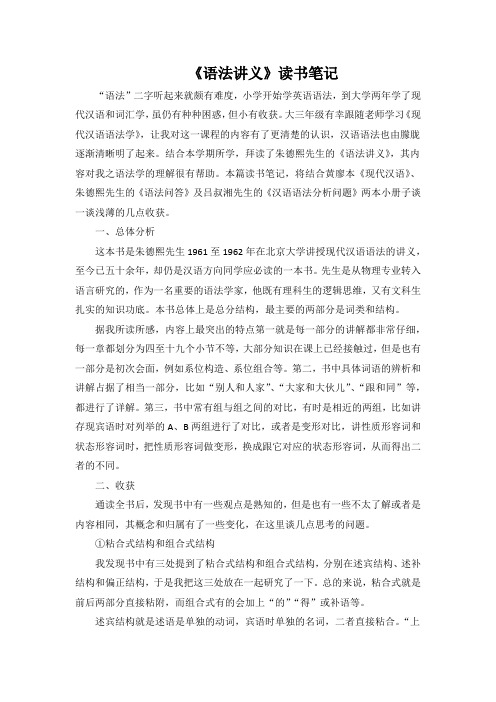
《语法讲义》读书笔记“语法”二字听起来就颇有难度,小学开始学英语语法,到大学两年学了现代汉语和词汇学,虽仍有种种困惑,但小有收获。
大三年级有幸跟随老师学习《现代汉语语法学》,让我对这一课程的内容有了更清楚的认识,汉语语法也由朦胧逐渐清晰明了起来。
结合本学期所学,拜读了朱德熙先生的《语法讲义》,其内容对我之语法学的理解很有帮助。
本篇读书笔记,将结合黄廖本《现代汉语》、朱德熙先生的《语法问答》及吕叔湘先生的《汉语语法分析问题》两本小册子谈一谈浅薄的几点收获。
一、总体分析这本书是朱德熙先生1961至1962年在北京大学讲授现代汉语语法的讲义,至今已五十余年,却仍是汉语方向同学应必读的一本书。
先生是从物理专业转入语言研究的,作为一名重要的语法学家,他既有理科生的逻辑思维,又有文科生扎实的知识功底。
本书总体上是总分结构,最主要的两部分是词类和结构。
据我所读所感,内容上最突出的特点第一就是每一部分的讲解都非常仔细,每一章都划分为四至十九个小节不等,大部分知识在课上已经接触过,但是也有一部分是初次会面,例如系位构造、系位组合等。
第二,书中具体词语的辨析和讲解占据了相当一部分,比如“别人和人家”、“大家和大伙儿”、“跟和同”等,都进行了详解。
第三,书中常有组与组之间的对比,有时是相近的两组,比如讲存现宾语时对列举的A、B两组进行了对比,或者是变形对比,讲性质形容词和状态形容词时,把性质形容词做变形,换成跟它对应的状态形容词,从而得出二者的不同。
二、收获通读全书后,发现书中有一些观点是熟知的,但是也有一些不太了解或者是内容相同,其概念和归属有了一些变化,在这里谈几点思考的问题。
①粘合式结构和组合式结构我发现书中有三处提到了粘合式结构和组合式结构,分别在述宾结构、述补结构和偏正结构,于是我把这三处放在一起研究了一下。
总的来说,粘合式就是前后两部分直接粘附,而组合式有的会加上“的”“得”或补语等。
述宾结构就是述语是单独的动词,宾语时单独的名词,二者直接粘合。
语法讲义的笔记(自己总结的 未完)

第二章 词的构造
1、句法和词法
句法研究的是句子的内部构造,以词为基本单位,词法研究的是词的内部构造,以语素作为基本单位。
2、合成词的构造方法有重叠、附加和复合三类。
在研究重叠式的时候,应该注意以下几个方面:重叠式的结构类型和语音特征(重音、变调);基式好重叠式的语法功能的异同;重叠式的语法意义。
6、不及物动词只能接准宾语,及物动词除了能带准宾语外,还能带真宾语。有的动词能兼带两种,但意义不同,如他笑你和他笑了。及物动词也不是一定要带着宾语,只有一小部分后头经常带宾语,如散步的散,结婚的结,它们在下列两种情况下也可以不带宾语,一是在回答的时候,一是原来的宾语仍在句子里,不过已转化为其他成分,如,他是去年结的婚。
词语与语素可以通过替换或扩展来区别。但不能一概而论,如我们把“理发”看成词,把扩展以后的格式(理了个发,理不理发)看成词组。洗澡、睡觉、散步、跳舞、上当、吃亏等等跟理发的情形相同。看见、说完、记住、染红、放下、穿上都能有限度的扩展,即插入“得”或“不”,因此我们把它们当作词组看待。
3、词组
5、动词和形容词有一部分可以重叠。有点形容词除了可以按照形容词的方式重叠以外,还可以按照动词的重叠方式重叠。如高高兴兴---高兴高兴,热热闹闹----热闹热闹。这些词兼属形容词和动词(不及物动词)两类。形容词重叠以后不受“很”修饰,因为形容词重叠之后本身就包含量的意义,所以不能用表示量的程度副词修饰它。
第四章 体词
第五章 谓词
1、谓词包括形容词和动词两类。
2、动词和形容词的区别:前边能不能加“很”,后边能不能带宾语。凡受“很”修饰而不能带宾语的是形容词,凡不受“很”修饰或能带宾语的是动词。
3、有的词带宾语时候是动词,不带宾语的时候是形容词,如委屈、端正、死。
英语语法讲义

四级语法讲义一:时态:所谓的"时态",就是时间+状态。
谓语动词的时态见下表:1.主动形式2.被动形式CET-4 常考的三种时态:过去完成时;将来完成时;(现在/过去)完成进行时。
时间状语从句当中的时态:一般过去时 所有的过去 用 一般现在时 表示 现在和将来 现在完成时 现在完成和将来完成一.非谓语动词一.不定式:一)不定式的常考形式:1) 一般形式:He decided to work harder in order to catch up with the others. 被动形式: He preferred to be assigned some heavier work to do.语法功能: 表示与谓语动词同步发生2) 完成形式:He pretended not to have seen me. 被动形式:The book is said to have been translated into many languages.语法功能:表示发生在谓语动词之前 二)不定式常考的考点:1)不定式做定语----将要发生过去 现在 将来 过去将来 一般 diddowill/shall do should/would do进行 was/were doing am/is/are doing will/shall be doing /完成had donehave/has donewill/shall have doneshould/would have done 用于虚拟语气完成进行 had been doing have/has been doing //过去现在将来过去将来 一般 was/were given am/is/are givenwill/shall be givenshould/would be given进行 was/were being givenam/is/are being given//完成had been givenhave/has been givenwill/shall have been given should/would have been given完成进行 / //2)不定式做状语----目的3)不定式充当名词功能---To see is to believe.三)不定式的省略1)感官动词see, watch, observe, notice, look at, hear, listen to, smell, taste, feel+ do表示动作的完整性,真实性;+ doing表示动作的连续性,进行性I saw him work in the garden yesterday.昨天我看见他在花园里干活了。
现代汉语讲义(第四章语法)
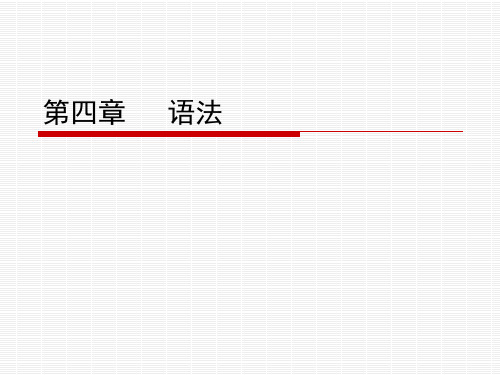
(五)语助词 助词表示某种特定的附加语法意义, 语气词主要表示句子的语气。
1.助词:黏着在词或短语上面,表示附 加意义,附着在后面的一律读轻声。 助词的分类:结构助词、时态助词、 其他助词。
2.语气词:一般用于句末表示语气,永 远黏着、后附、轻声。也可用于句中,主 要用在主语后。 语气词的分类:表陈述、疑问、祈使、 感叹语气四类。
二、单句
1.主谓句 (1)动词性谓语句 可分为动词谓语句、述宾谓语句、述 补谓语句、连谓谓语句、兼语谓语句、 主谓谓语句。 (2)形容词性谓语句 形容词谓语句、形补谓语句。 (3)名词性谓语句 名词谓语句、数量谓语句、定心谓语 句。
2.非主谓句。 (1)名词性非主谓句 (2)动词性非主谓句 (3)形容词性非主谓句 (4)特殊非主谓句
3.偏正词组:前面的成份(修饰语)修饰 限定后面的成份(中心语)。可分为体词性 的和谓词性的两类。 修饰语是定语的称为定心词组,是名词性 词组。 修饰语是状语的称为状心词组,是谓词性 词组。
4.述补词组:补充与被补充的关系。 根据带不带结构助词“得”可分为:(1) 数量补语:量词结构作补语,不能带“得” ;(2)情态补语:补语说明动作或有关事务 的状态,必须带“得”;(3)结果补语:补 语表示动作的结果,可由形容词或动词充当 ,不带“得”;(4)趋向补语:补语表示动 作的趋向,不带“得”;(5)可能补语:补 语表示可能性或不可能性,由结果补语和趋 向补语中间插入“得/不”;(6)程度补语 :补语表示程度,由副词构成。
三、存现句 存现句的类别。
四、把字句 把字句的特点。
五、被字句 被字句的特点及变体。
第八节 句类系统
句类是按照句子的语气功能划分出 来的类型系统。
一、陈述句 语气词及否定形式。
高考英语一轮复习语法总结讲义
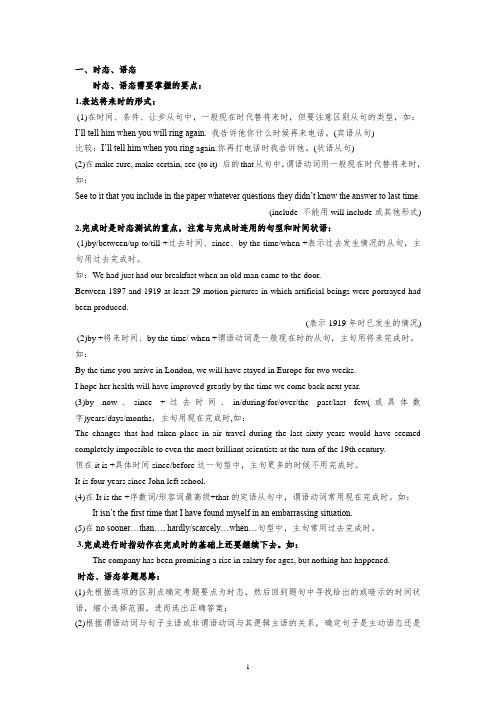
一、时态、语态时态、语态需要掌握的要点:1.表达将来时的形式:(1)在时间、条件、让步从句中,一般现在时代替将来时,但要注意区别从句的类型,如:I’ll tell him when you will ring again. 我告诉他你什么时候再来电话。
(宾语从句)比较:I’ll tell him when you ring again.你再打电话时我告诉他。
(状语从句)(2)在make sure, make certain, see (to it) 后的that从句中,谓语动词用一般现在时代替将来时,如:See to it that you include in the paper whatever questions they didn’t know the answer to last time.(include 不能用will include或其他形式) 2.完成时是时态测试的重点,注意与完成时连用的句型和时间状语:(1)by/between/up to/till +过去时间、since、by the time/when +表示过去发生情况的从句,主句用过去完成时。
如:We had just had our breakfast when an old man came to the door.Between 1897 and 1919 at least 29 motion pictures in which artificial beings were portrayed had been produced.(表示1919年时已发生的情况) (2)by +将来时间、by the time/ when +谓语动词是一般现在时的从句,主句用将来完成时。
如:By the time you arrive in London, we will have stayed in Europe for two weeks.I hope her health will have improved greatly by the time we come back next year.(3)by now、since +过去时间、in/during/for/over/the past/last few(或具体数字)years/days/months,主句用现在完成时,如:The changes that had taken place in air travel during the last sixty years would have seemed completely impossible to even the most brilliant scientists at the turn of the 19th century.但在it is +具体时间since/before这一句型中,主句更多的时候不用完成时。
初中英语语法精讲讲义(完整版)
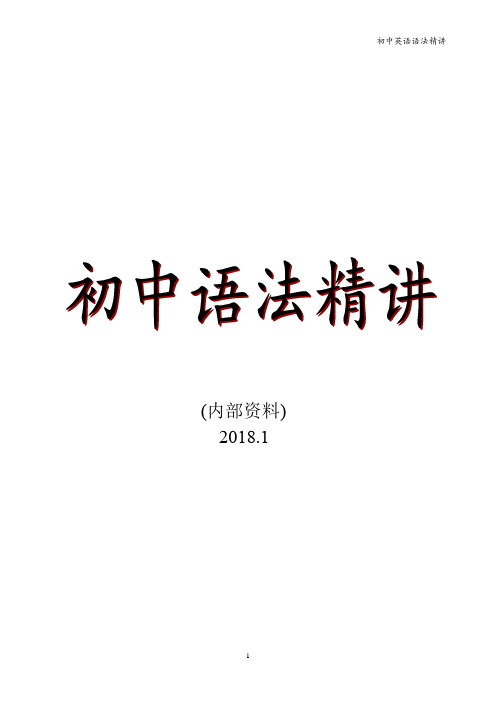
(内部资料) 2018.1目录第一讲名词第二讲冠词第三讲代词第四讲数词第五讲介词第六讲形容词和副词第七讲连词第八讲情态动词第九讲非谓语动词第十讲时态第十一讲被动语态第十二讲祈使句、倒装句、反意疑问句和感叹句第十三讲宾语从句第十四讲定语从句第十五讲状语从句第十六讲主谓一致第十七讲情景交际第十八讲词义辨析附录I 重点短语概述一、概述语法是研究词形变化和句子结构的科学,研究词形变化的部分成为词法(名词的数、格,动词的时态、语态),研究句子结构的部分称为句法(句子成分、语序,句子种类)。
二、英语词类词类英语作用在句中成分例词1名词n.表示人或物的名称主、宾、表、定、同位mother, son 2形容词adj.表示人或物的特征定、表、补、状big, small 3数词num.表示数目或顺序主、宾、nine, first 4代词pron.代替名词,数词主语宾语定语he, him, his 5动词v.表示动作或状态谓come, write 6副词adv.表示动作特征或性状特征状、表very, slowly 7冠词art.用在名词前说明其意义不做成分a, an, the8介词prep.用在名代前说明它与别的词之间的关系不做成分for, from, to 9连词conj.用来连接词与词或句与句不做成分and, but, if 10感叹词interj.表示说话时的感情或口气不做成分oh, ow三、句子成分句子中有两个最重要最基本的成分,主语和谓语。
除了主语和谓语,句子有时还有其他成分,宾语、定语、状语、表语等。
主语:一般位于句首,说明所要讲述的对象或主体,表示要说的“谁”或“什么”,一般由名词、代词或名词性的词类、短语或从句充当。
We often practise speaking English after class.Your father’s car is new.Watching English films is a good way to learn English.谓语:位于主语之后,说明主语的情况(动作或状态)---“做什么”“是什么”“怎么样”。
语法讲义( 冠词)

语法课讲义(一)一学习目标1 不定冠词和定冠词的功能2 零冠词的几种情况二知识要点1 冠词在数量上只有3个,分类如下:不定冠词(a/an)冠词定冠词(the):冠词不是单用词,其后必须跟名词,中间可加修饰词。
三具体应用不定冠词1位置单数可数名词前2 方法a+辅音音素an+元音音素功能1 表示“一”这个数量概念a book 一本书 a chair 一把椅子 a university 一所大学an orange 一个橙子an hour 一个小时an egg 一个鸡蛋2 表示“每一”这个频率概念I go to school five days a week. She usually cleans her house twice a week. The pork is 20 yuan a kilo.3 使抽象内容具体化have a cold=catch a cold 感冒have a good time 玩得开心不定冠词的常用短语a knife and fork 一副刀叉want a go 试一下as a result 因此in a word 总之take a break 休息一会儿all of a sudden 突然as a matter of fact 事实上have a swim 游泳take a walk = go for a walk 散步定冠词定冠词的功能与使用1 上文提到过的人或物再次提到There is a man. The man has a hen. The hen gives him a golden egg every day. This is a yo-yo and the yo-yo is Tom’s.2 特指双方都明白的人或物Look at the blackboard. The girl in pink is my sister.in the east in the south in the west in the northon the right on the leftin the past at the present in the future3 宇宙间“独一无二”的天体名称之前the sky the moon the sun the earth the world4 the 加姓的复数代表某某一家人,永远都当复数看The Whites are watching TV now.Mr. Kings often visit their neighbor on weekend.5 the 用在乐器名称前play the guitar play the piano play violin6 the加形容词代表一类人或事物通常谓语动词用复数the old 老人the young 年轻人the poor 穷人The old need our help and care. 老人需要我们的帮助和关怀。
初中英语语法讲义

名词含义:表示人、事物、地方、现象或抽象概念等的名称的词。
注:1.专有名词是指人、地方、团体、机构等特有的名称。
第一个字母必须大写。
专有名词前一般不加冠词。
2、有普通名词构成的专有名词前要用定冠词“the”,但它不大写。
3、有些不可数名词有时表示为具体的东西时,则变为可数名词,而且意思上也有了变化。
Eg : beer ----a beer 一杯啤酒work--- a work 工厂,著作glass---a glass 一个玻璃杯room 空间---a room 一个房间二、 名词的数:表示可以计算数目的人或物称为可数名词。
可数名词有单、复数两种形式:可数名词的单数形式要在名词前加 “a 或an”;复数形式是在名词后加 “-s 或-es”。
名词复数形式有规则变化和不规则变化两种12. 可数名词复数的不规则变化① 改变单数名词中的元音字母eg. man--men, woman—women, tooth—teeth, foot—feet, mouse--mice② 单复数同形eg. Chinese-Chinese, deer-deer, fish-fish, sheep-sheep,③ 由man 和woman构成的合成词, 每个名词都要变复数eg. a man doctor— men doctors, a woman teacher--women teachers 注: 有些名词表示一种物体具有不可分割的相同的两部分,在使用时只有复数形式eg. trousers, clothes, glasses, shorts, etc;有些名词从形式上看是复数, 实际上是单数(其后的谓语动词要用单数).eg. maths , physics, politics, news3. 不可数名词:表示不能计算数目的人或物,称为不可数名词。
他们前面不能用a/an,没有复数形式。
物质名词和抽象名词都属于不可数名词。
不可数名词一般只有单数形式, 但有其特殊用法:(1)同一个词,变成复数形式, 意义不同。
语法讲义

第一部分虚拟语气的用法要点一.Should+动词原形型1.坚决要命型:在“建议”propose, suggest, advise,recommend,“决定”insist,decide,“要求,需要”require, demand, request, ask,“命令”order等动词后的宾语从句中要求用虚拟语气,其形式是should +动词原形,should可以省略。
1)He proposed that we (should) set up a committee to look into the matter. 他提议我们建立一个委员会来调查此事。
2)He wanted to go to Paris, but the doctor asked that he not go.他想去巴黎,但医生要他别去。
We advised that they should start early.我们建议他们及早开始。
I’m not the person to recommend how the job should be done.我不是能为做此事出主意的人。
2.与上述动词相关的主语从句及同位语从句中也要求用虚拟语气,其形式是should+动词原形,should可以省略。
如:It has been ordered that no one should go to bed until further information.命令说没有进一步的通知谁都不能休息。
It was suggested that measures be taken to minimize the damage.有人建议采取措施把损失降到最小。
My proposal is that he be in charge of the whole thing.我建议由他来负责整件事。
3.在含有形容词necessary(必需的,需要的), important(重要的), essential(必要的,不可缺少的),advisable(明智的,可取的), strange(奇怪的),incredible(难以置信的),vital(至关重要的)等的主语从句中及it’s a pity, it is a shame, it is no wonder等主语从句中要求用虚拟语气,其形式是should+动词原形,should可以省略。
语法讲义
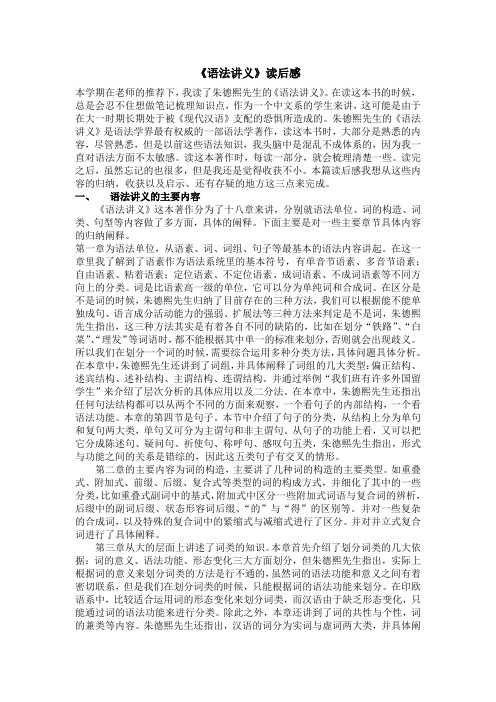
《语法讲义》读后感本学期在老师的推荐下,我读了朱德熙先生的《语法讲义》。
在读这本书的时候,总是会忍不住想做笔记梳理知识点,作为一个中文系的学生来讲,这可能是由于在大一时期长期处于被《现代汉语》支配的恐惧所造成的。
朱德熙先生的《语法讲义》是语法学界最有权威的一部语法学著作,读这本书时,大部分是熟悉的内容,尽管熟悉,但是以前这些语法知识,我头脑中是混乱不成体系的,因为我一直对语法方面不太敏感。
读这本著作时,每读一部分,就会梳理清楚一些。
读完之后,虽然忘记的也很多,但是我还是觉得收获不小。
本篇读后感我想从这些内容的归纳,收获以及启示、还有存疑的地方这三点来完成。
一、语法讲义的主要内容《语法讲义》这本著作分为了十八章来讲,分别就语法单位、词的构造、词类、句型等内容做了多方面,具体的阐释。
下面主要是对一些主要章节具体内容的归纳阐释。
第一章为语法单位,从语素、词、词组、句子等最基本的语法内容讲起。
在这一章里我了解到了语素作为语法系统里的基本符号,有单音节语素、多音节语素;自由语素、粘着语素;定位语素、不定位语素、成词语素、不成词语素等不同方向上的分类。
词是比语素高一级的单位,它可以分为单纯词和合成词。
在区分是不是词的时候,朱德熙先生归纳了目前存在的三种方法,我们可以根据能不能单独成句、语言成分活动能力的强弱、扩展法等三种方法来判定是不是词,朱德熙先生指出,这三种方法其实是有着各自不同的缺陷的,比如在划分“铁路”、“白菜”、“理发”等词语时,都不能根据其中单一的标准来划分,否则就会出现歧义。
所以我们在划分一个词的时候,需要综合运用多种分类方法,具体问题具体分析。
在本章中,朱德熙先生还讲到了词组,并具体阐释了词组的几大类型:偏正结构、述宾结构、述补结构、主谓结构、连谓结构。
并通过举例“我们班有许多外国留学生”来介绍了层次分析的具体应用以及二分法。
在本章中,朱德熙先生还指出任何句法结构都可以从两个不同的方面来观察,一个看句子的内部结构,一个看语法功能。
雅思英语语法讲义
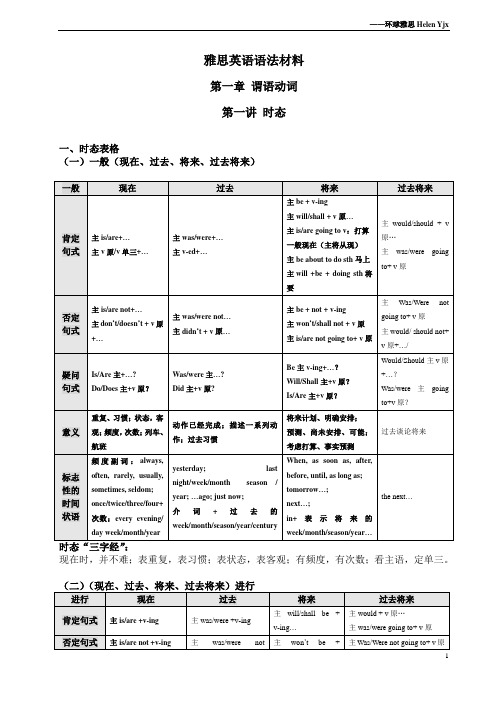
雅思英语语法材料第一章谓语动词第一讲时态一、时态表格(一)一般(现在、过去、将来、过去将来)现在时,并不难;表重复,表习惯;表状态,表客观;有频度,有次数;看主语,定单三。
(三)(现在、过去、将来、过去将来)完成(四)(现在、过去、将来、过去将来)完成进行二、基本时态演练Listening to the following conversation.(一) Task One: fill in the blanks.1. Interviewer: Your name?Peter: Peter __________. (1)2. Interviewer: ________ (2) you work or _________ (3) you a student?Peter: I’m studying really hard for my exams this month—I’m doing math’s at university—but I also________ (4) my parents out. They own a _________ (5) and I ________ (6) there as a waiter in the evenings, so I ____________ (7) a lot of free time during the week.My mom is always saying that I _____________ (8) enough in the restaurant! But I do manage to find some free time most days.3. Interviewer: Can you look at the _____ (9) and tell me whether you do any of these things and if so, how ____ (10)?Peter: I love music and I’m learning to play the piano. I ______ (11) really early and practice for an hour or so just about every day. I also play the guitar in a band with some other friends. We used to practice together at least _____________ (12) a week but these days we only manager to meet about once __________________ (13).4. Interviewer: What about the next thing on the list? -_________________ (14)?Peter: Well, I used to play them all the time but now I’m too busy studying and I _______ (15) miss them at all.5. Interviewer: Do you use a computer for other things?Peter: I use the Internet just about ________ (16) for my studies. And I also use it to _____________ (17) my friends and my family. My cousin is living in Thailand at the moment and he _______ (18) me regular emails to let me know how much fun he’s having! He’s always visiting exciting places.6. Interviewer: Now, how about _________________ (19)?Peter: Actually, I joined the local football team when I was at school and I still play _______________ (20) provided I can get to training. I much prefer playing football to watch it on TV, though I do ______________ (21) watch a match if there’s a big final or something.7. Interviewer: What about going to watch live matches?Peter: I’d love to be able to afford to go every week because I ____________ (22) my local team, but students don’t ____________ (23) have much money, you know! I can remember the ___________ (24) I went to a live match. Oh, sorry, I can see my friends—I ____________ (25)go now!(二)Task TwoRead through the conversation and find out:1. Present simple sentences:2. Present continuous:3. Past simple sentences:三、时态改错1. People should act according to what they are believing.2. In general, I think our government spent too much money on space travel.3. Nowadays, many people in my country have sent their children to single-sex schools.4. These days, more and more people traveling to very distant places for their holidays.5. I am hoping it is not too late to save the environment.6. The female hen laying on average 5 or 6 eggs per week.7. Younger drivers is more likely to be involved in a car accident.8. Most doctors are agreeing that the only way to lose weight is by doing more exercise.第二讲语态一、被动语态的形式二、被动语态使用情景(一)一般说来,当强调动作承受者,不必说出执行者或含糊不清的执行者时,多用被动式1. I agree with the statement that there should be no government restriction on creative artists who express themselves in the way they do and that they must be given freedom for the same. (IELTS 4, Band 7, p167)2. There is almost everything good in what is given to us through the media world which is made up of artists. (同上)3. In conclusion, I strongly agree with that children should be taught to cooperate rather than compete. (IELTS 5, Band 6, p167)4. It was opened in the year 1863, and it is already 140 years old. (IELTS 5, Band 7, p168)(二)在描述事件和客观事实的时候,被动语态用得更多1. The use of electricity in England is indispensed with. (IELTS 4, Band 6, p164)2. Demand for electricity in England during typical days in winter and summer is illustrated in the graph. (同上)3. The use of average English home is shown in the pie chart. (同上)(三)主语是泛指很多人或者大部分人这个方面1. A more dramatic rise is predicted between 2030 and 2040 in Japan, by which it is thought thatthe proportion of elderly people will be similar in the three countries. (IELTS 5, model answer, p162)2. It can be argued that…It is advised/believed/universally accepted/generally recognized that…It is said/reported/estimated that…(四)当上下文已经说明了动作执行者时:A law was introduced to help protect people in this situation.(五)动作的执行者并不重要时:In the factory, the shoes are cleaned and packed into boxes ready for sale.(六)需要体现动作的执行者时,加by-短语:A lot of waste materials could be recycled by large manufacturers.三、剑指考试1. To enrich vocabulary, we should read more authentic materials.可以改为:(1)(2)(3)2. It is important for nations all over the world to work hard together to control the environmental pollution.可以改为:3. I am not sure whether all the college graduates can find jobs after graduation.可以改为:4. 用适当的动词形式完成下列句子:(1)My home _____________ (locate) in the western part of the city.(2)These funds can _____________ (give) to the poorer people to help them.(3)We _____________ (not tell) that the rules had changed.(4)Children need to _____________ (teach) the correct way to behave in public.5. 句子改错:(1)The house was sell for over a million dollars.(2)The class has allowed to eat in the staff dining room during the renovations.(3)The potatoes carry along a conveyor belt to a room where they wash and peel. (4)The teacher told to take her class out of the school if the fire bell rang.(5)Smoking don’t allow in any part of the aeroplane.(6)The museum was being renovating when we were there, so we could not visit it. (7)Bus tickets can buy at any newsagents.(8)New employees have instructed not to operate the photocopier until they are trained.6. 把下面的句子改成被动语态,并决定是否需要带by-短语(1)A factory worker checks each box for quality.(2)The government does not permit children under 16 to work.(3)The washing machine is washing your clothes at the moment.(4)A mechanic will repair your car this afternoon.(5)The agent has sold our house at last.(6)Something tore the back of my coat.(7)The employer pay off the staff more for working at the weekend.(8)Burning tires give off highly toxic chemicals.第三讲虚拟语气请欣赏下列一首诗歌:If you were a teardrop in my eye,For fear of losing you, I would never cry.And if the golden sun should cease to shine its light,Just one smile from you would make my whole world bright.一、虚拟语气基本句型1. 与现在事实相反(1) If she were sick, she could stay at home and have a rest today.(2) If you watched more and talked less, we would both enjoy our film.2. 与过去事实相反(1) If they had studied earlier, they would have passed the IELTS.(2) Helen would have graduated with her class if she had been able to meet all the requirements in time.3. 与将来事实相反(1) If it snowed tomorrow, I would go skiing.(2) If it should snow tomorrow, I would go to make a snowman in front of our dormitory.(3) If you were to see your tutor, what would you tell him?4.错综的虚拟语气(1) If I were you, I wouldn’t have told that to her. (时间错综:从句现在,主句过去)(2) Had I taken my umbrella with me in the morning, I should not be wet now. (时间错综:从句过去,主句现在)5.虚拟语气的倒装可以把条件句中的if 省略掉,同时把should, were, had 等助动词提前,构成倒装句。
英语语法讲义(精简版)
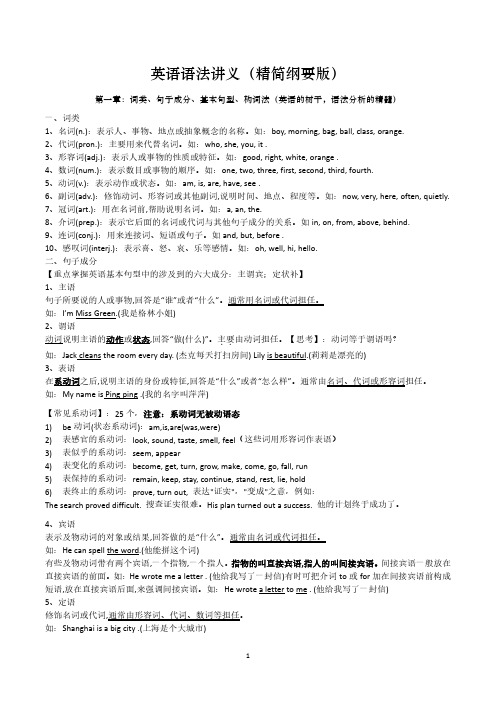
英语语法讲义(精简纲要版)第一章:词类、句子成分、基本句型、构词法(英语的树干,语法分析的精髓)一、词类1、名词(n.):表示人、事物、地点或抽象概念的名称。
如:boy,morning,bag,ball,class,orange.2、代词(pron.):主要用来代替名词。
如:who,she,you,it.3、形容词(adj.):表示人或事物的性质或特征。
如:good,right,white,orange.4、数词(num.):表示数目或事物的顺序。
如:one,two,three,first,second,third,fourth.5、动词(v.):表示动作或状态。
如:am,is,are,have,see.6、副词(adv.):修饰动词、形容词或其他副词,说明时间、地点、程度等。
如:now,very,here,often,quietly.7、冠词(art.):用在名词前,帮助说明名词。
如:a,an,the.8、介词(prep.):表示它后面的名词或代词与其他句子成分的关系。
如in,on,from,above,behind.9、连词(conj.):用来连接词、短语或句子。
如and,but,before.10、感叹词(interj.):表示喜、怒、哀、乐等感情。
如:oh,well,hi,hello.二、句子成分【重点掌握英语基本句型中的涉及到的六大成分:主谓宾;定状补】1、主语句子所要说的人或事物,回答是“谁”或者“什么”。
通常用名词或代词担任。
如:I’m Miss Green.(我是格林小姐)2、谓语动词说明主语的动作或状态,回答“做(什么)”。
主要..由动词担任。
【思考】:动词等于谓语吗?如:Jack cleans the room every day.(杰克每天打扫房间)Lily is beautiful.(莉莉是漂亮的)3、表语在系动词之后,说明主语的身份或特征,回答是“什么”或者“怎么样”。
英语语法讲义

英语语法袁鹤飞Prsent Tense1) 经常性或习惯性的动作e.g.: I leave home for school at 7 every morning.2)客观真理,客观存在,科学事实e.g. The earth moves around the sun.Shanghai lies in the east of China3) 格言或警句中e.g.: Pride goes before a fall. 骄者必败。
•注意:此用法如果出现在宾语从句中,即使主句是过去时,从句谓语也要用一般现在时。
•Eg.: Columbus proved that the earth is round.4) 现在时刻的状态、能力、性格、个性e.g.: I don’t want so much.Ann Wang writes good English but doesnot speak well.Progressive Tense⏹ 1. 现在进行时⏹1)现在进行时表示现在正在进行的动作,由“ to be十现在分词”构成,另外“系动词十介词或副词”也表示进行时的意义.例如:What are you doing?The bridge is under construction.⏹2)表示感觉,愿望和状态的某些动词如have,be,hear,see,like等词一般不用进行时.⏹2.过去进行时的用法过去进行时表示过去某一时刻、某一阶段正进行的动作,由“ was(were)十现在分词”构成.例如:In 1980 he was studying in a university.He was reading a novel when I came in.⏹The fifth generation computers, with artificial intelligence, _______and perfected now.A) developed B) have developed⏹C) are being developed D) will have been developed⏹ C⏹具有人工智能的第五代计算机目前正在开发和完善之中"。
现代汉语语法讲义- 郑贵友(全269页)

现代汉语语法讲义北京语言大学郑贵友第一章语法概说一、语法和语法学二、语法单位三、句子成分四、句子分析——分析句子的两种方法第二章词类一、词类的含义及词类划分的目的二、词类划分的标准三、词的一级分类和再分类四、各类实词名词动词形容词区别词数词量词代词副词/象体词五、各类虚词介词连词助词语气词六、兼类问题第三章短语一、定义二、短语的种类三、短语的构成手段四、简单短语和复杂短语五、单义短语和多义短语六、自由短语和固定短语七、短语和词宏观上的同与异第四章句子成份一、句子成分的性质二、主语、谓语主语的语法构成主语的语义类型谓语的语法构成三、动语、宾语动语的语法构成有宾动词无宾动词宾语的语法构成宾语的语义类型四、定语五、状语六、补语补语的语法构成补语的语义类型宾语、补语的顺序数量宾语和数量补语七、中心语八、独立语第五章单句一、基本概念二、句型确定的原则和方法三、主谓句主谓谓语句双宾语句连动句兼语句存现句“把”字句“被”字句“是”字句“有”字句“所”字句四、非主谓句五、单句和短语第六章歧义分析一、歧义的含义及歧义研究的目的二、歧义的种类(1)同音造成的歧义同形造成的歧义一词多义造成的歧义词兼类造成的歧义语义关系不同造成的歧义三、歧义的种类(2)第七章复句一、复句的含义二、复句中的关系词语三、复句的分类四、广义的并列关系五、广义的因果句因果关系目的关系假设关系条件关系六、广义的转折句七、复句的扩充八、复句的紧缩第一章语法概说一、语法和语法学(一)语法1.语法的含义及其作用(1)语法的含义语法,是语言中的词、短语、句子的构造规律。
语言有三个要素,语音、词汇和语法。
其中,语音是由人的发音器官发出的、表达一定意义的声音,是语言的物质外壳。
词汇,是语言中的语素、词和固定短语以及现成话的集合,是语言的建筑材料。
而语法则是语言“建筑体”的建筑法则。
西方传统语言学认为,语法包括两个大的方面:词法和句法。
词法,主要涉及词的构成、词的分类和词形变化等内容。
语法讲义:第四章 句子成分
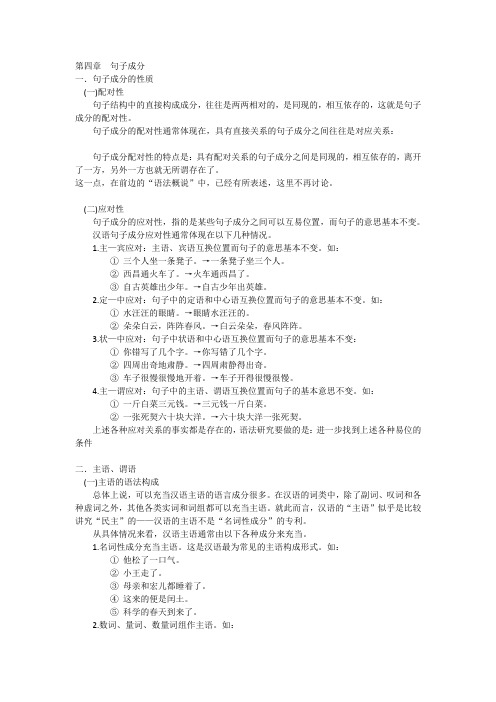
第四章句子成分一.句子成分的性质(一)配对性句子结构中的直接构成成分,往往是两两相对的,是同现的,相互依存的,这就是句子成分的配对性。
句子成分的配对性通常体现在,具有直接关系的句子成分之间往往是对应关系:句子成分配对性的特点是:具有配对关系的句子成分之间是同现的,相互依存的,离开了一方,另外一方也就无所谓存在了。
这一点,在前边的“语法概说”中,已经有所表述,这里不再讨论。
(二)应对性句子成分的应对性,指的是某些句子成分之间可以互易位置,而句子的意思基本不变。
汉语句子成分应对性通常体现在以下几种情况。
1.主—宾应对:主语、宾语互换位置而句子的意思基本不变。
如:①三个人坐一条凳子。
→一条凳子坐三个人。
②西昌通火车了。
→火车通西昌了。
③自古英雄出少年。
→自古少年出英雄。
2.定—中应对:句子中的定语和中心语互换位置而句子的意思基本不变。
如:①水汪汪的眼睛。
→眼睛水汪汪的。
②朵朵白云,阵阵春风。
→白云朵朵,春风阵阵。
3.状—中应对:句子中状语和中心语互换位置而句子的意思基本不变:①你错写了几个字。
→你写错了几个字。
②四周出奇地肃静。
→四周肃静得出奇。
③车子很慢很慢地开着。
→车子开得很慢很慢。
4.主—谓应对:句子中的主语、谓语互换位置而句子的基本意思不变。
如:①一斤白菜三元钱。
→三元钱一斤白菜。
②一张死契六十块大洋。
→六十块大洋一张死契。
上述各种应对关系的事实都是存在的,语法研究要做的是:进一步找到上述各种易位的条件二.主语、谓语(一)主语的语法构成总体上说,可以充当汉语主语的语言成分很多。
在汉语的词类中,除了副词、叹词和各种虚词之外,其他各类实词和词组都可以充当主语。
就此而言,汉语的“主语”似乎是比较讲究“民主”的——汉语的主语不是“名词性成分”的专利。
从具体情况来看,汉语主语通常由以下各种成分来充当。
1.名词性成分充当主语。
这是汉语最为常见的主语构成形式。
如:①他松了一口气。
②小王走了。
③母亲和宏儿都睡着了。
崔荣容英语语法讲义
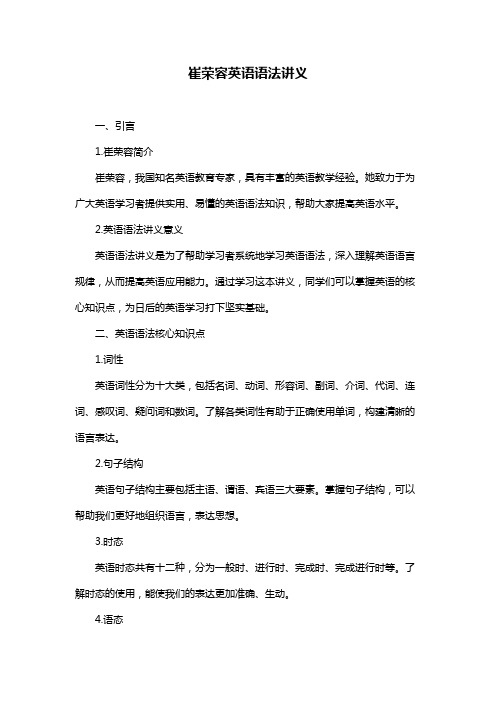
崔荣容英语语法讲义一、引言1.崔荣容简介崔荣容,我国知名英语教育专家,具有丰富的英语教学经验。
她致力于为广大英语学习者提供实用、易懂的英语语法知识,帮助大家提高英语水平。
2.英语语法讲义意义英语语法讲义是为了帮助学习者系统地学习英语语法,深入理解英语语言规律,从而提高英语应用能力。
通过学习这本讲义,同学们可以掌握英语的核心知识点,为日后的英语学习打下坚实基础。
二、英语语法核心知识点1.词性英语词性分为十大类,包括名词、动词、形容词、副词、介词、代词、连词、感叹词、疑问词和数词。
了解各类词性有助于正确使用单词,构建清晰的语言表达。
2.句子结构英语句子结构主要包括主语、谓语、宾语三大要素。
掌握句子结构,可以帮助我们更好地组织语言,表达思想。
3.时态英语时态共有十二种,分为一般时、进行时、完成时、完成进行时等。
了解时态的使用,能使我们的表达更加准确、生动。
4.语态英语语态分为主动语态和被动语态。
掌握语态变换,可以让我们的语言表达更加丰富。
5.情态动词情态动词在英语中具有重要地位,它们可以表示可能性、推测、建议等含义。
6.从句从句是英语中复杂句子的基本构成部分,主要包括名词从句、状语从句、定语从句等。
7.虚拟语气虚拟语气用于表示与事实相反的假设、建议、愿望等。
掌握虚拟语气的使用,有助于提高英语表达的准确性。
三、实用语法技巧1.语法错误规避了解常见的语法错误,如主谓一致、单复数错误等,避免在实际应用中出现失误。
2.复杂句简化学会将复杂句子简化,提高语言表达的清晰度。
3.提高写作表达能力运用所学语法知识,丰富写作表达,提高文章质量。
4.口语表达流畅性在口语交流中,灵活运用语法知识,使表达更加流畅。
四、案例分析与讲解1.典型错误案例本部分将列举一些典型的语法错误案例,帮助同学们引以为戒。
2.正确使用语法示范针对错误案例,给出正确使用语法的示范,让同学们更加清晰地了解正确用法。
五、总结与展望1.英语语法学习方法要学好英语语法,需要循序渐进,不断总结规律,并进行实际应用。
高考英语复习语法知识讲解讲义(5种基本句型+4种句子成分)
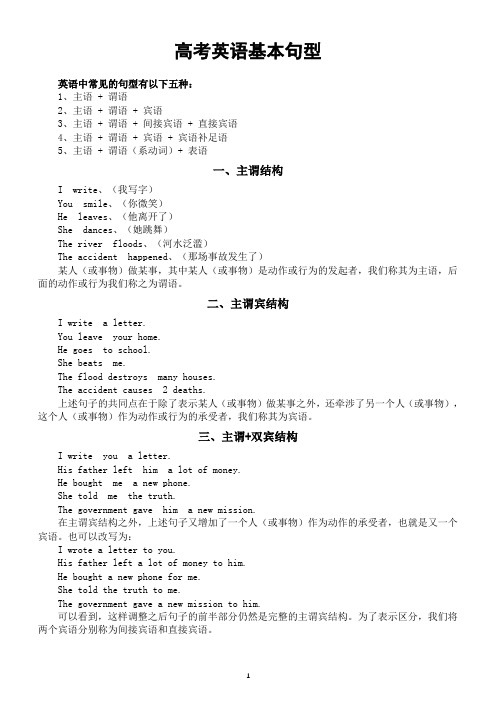
高考英语基本句型英语中常见的句型有以下五种:1、主语 + 谓语2、主语 + 谓语 + 宾语3、主语 + 谓语 + 间接宾语 + 直接宾语4、主语 + 谓语 + 宾语 + 宾语补足语5、主语 + 谓语(系动词)+ 表语一、主谓结构I write、(我写字)You smile、(你微笑)He leaves、(他离开了)She dances、(她跳舞)The river floods、(河水泛滥)The accident happened、(那场事故发生了)某人(或事物)做某事,其中某人(或事物)是动作或行为的发起者,我们称其为主语,后面的动作或行为我们称之为谓语。
二、主谓宾结构I write a letter.You leave your home.He goes to school.She beats me.The flood destroys many houses.The accident causes 2 deaths.上述句子的共同点在于除了表示某人(或事物)做某事之外,还牵涉了另一个人(或事物),这个人(或事物)作为动作或行为的承受者,我们称其为宾语。
三、主谓+双宾结构I write you a letter.His father left him a lot of money.He bought me a new phone.She told me the truth.The government gave him a new mission.在主谓宾结构之外,上述句子又增加了一个人(或事物)作为动作的承受者,也就是又一个宾语。
也可以改写为:I wrote a letter to you.His father left a lot of money to him.He bought a new phone for me.She told the truth to me.The government gave a new mission to him.可以看到,这样调整之后句子的前半部分仍然是完整的主谓宾结构。
- 1、下载文档前请自行甄别文档内容的完整性,平台不提供额外的编辑、内容补充、找答案等附加服务。
- 2、"仅部分预览"的文档,不可在线预览部分如存在完整性等问题,可反馈申请退款(可完整预览的文档不适用该条件!)。
- 3、如文档侵犯您的权益,请联系客服反馈,我们会尽快为您处理(人工客服工作时间:9:00-18:30)。
英语句子成分与词性句子构成的成分共分为八种:主语,谓语,宾语,表语,定语,补语,状语和同位语。
1.主语:是全句述说的对象。
一般位于句首,除了there be结构,疑问句和倒装句中。
Walls have ears.To see is to believe.Smoking is not allowed in public places.Whether or not they will come depends on the weather.2.谓语:说明主语的情况,永远只能由动词(实义动词或系动词)组成。
助动词或情态动词加其他动词的适当形式也构成谓语动词。
Actions speak louder than words.The chance may never come again.Tom was very sick at heart.Mary has been working at the dress store since 1994.3.表语:系动词之后的成分,表示主语的身份,特征和状态。
常见的系动词有:be, appear, become, feel, get, go, grow, keep, look, prove, remain, seem, sound, smell, stay, taste, turn等。
My father is a professor.Who’s that? It’s me.The match became very exciting.The story of my life may be of help to others.His plan is to seek work in the city.My first idea was that you should hide your feelings.4.宾语:表示动作的对象,是动作的承受者。
跟在及物动词或不及物动词+介词之后。
She covered her face with her hands.We haven’t seen her for a long time.Do you mind opening the window?Give me four please!He wants to dream a nice dream.We need to know what others are doing.5.定语:修饰名词的成分。
They are woman worker.Tom’s father didn’t write home until yesterday.Equal pay for equal work should be introduced.You haven’t kept your promise to write us often.Those who want to go to Tibet are to sign their names here.6.补语:补充说明宾语或主语的性质和状态。
宾语补足语They elected me captain of the team.We found everything there in good order.I should advise you not to miss the chance.主语补足语The price is expected to rise in the near future.Some goods are left unsold.She was elected director of public relations.7.状语:可以修饰动词,形容词,副词或者全句。
表示地点,时间,原因,目的,结果,条件,让步,程度,方式,伴随情况等。
These products are selling quickly.She sat there doing nothing.We’ll send a car over to fetch you.8.同位语:用来补充说明另一个名词(短语)或代词的具体内容或情况。
We should make full use of today, the hope of tomorrow.People, old and young, came out to greet the distinguished guests.We two like the saying: money talks.9.插入语:对一句话的附加说明,常用逗号或破折号与其他成分隔开,在语法上不影响其他成分。
True, it would be too bad.To be frank, I don’t quite agree with you.Judging by his clothes, he may be an artist.That, in my opinion, is only one of the minor issue.关于比较等级1.原级比较表示双方程度相等用as+原级+as (和…一样)He is as busy as before.We should send you the data as soon as possible.表示双方程度不相等用not so (as) +原级+as (和…不一样,不如…那样)It is not so (as) cold today as yesterday.He didn’t make as much progress as he had expected.2.比较级比较级可用much, far, a lot, a great deal, a little, a bit等词与词组修饰The new method is much more efficient than the old one.She ran a little (bit) faster than her younger brother.关于倍数的表达Kids are twice as troublesome as pets.Americans eat more than twice as many vegetable today as they did in 1950.We have produced three times as much grain as compared with last year. Practice:改错1.School violence is most serious problem, especial in public school.-----School violence is the most serious problem, especially in public school s. 2. Students are not enough mature so they are vulnerable to social evils.基本时态1.一般现在时表示现在,目前存在的状态,性质或经常发生的动作。
谓语动词:am, is, are或do,does常用时间词:always, usually, sometimes, seldom, everyday等。
2.一般过去时表示过去的动作和状态。
谓语动词:was, were, did常用时间词:yesterday, two days ago, last week, in 1996, during the night, in ancient times等。
※在it is high (about) time (that) …句型中,表示“该……的时候了”,从句的谓语动词通常用一般过去时。
It is high time that the government and common people joined hand in hand to protect the deteriorating environment.3.一般将来时表示将要发生的动作或状态。
谓语动词:will/shall do, be going to do, be about to do,常用的时间词:tomorrow, tonight, by then, in the near future, next spring等。
4.现在完成时谓语动词:have/has +过去分词常用的时间词:already(肯定),yet(否定),recently, till now, so far, ever, never等a.过去发生并已经完成的动作,对现在造成了影响。
Till now I have read many novels.Long-distance education has basically covered the whole country so far.b.过去某一时间开始并一直持续到现在的动作或状态,也许还有可能持续下去。
She has lived in Nanchang since 1980.The computer has gradually been used in libraries and hospitals.5.过去完成时谓语动词:had +过去分词常和by, before等词组成的短语和从句连用。
People had imagined what the surface of the moon looked like before Neil Armstrong first stepped onto the planet.Radio had been the most important communication tool before TV was invented.英语句子种类:简单句,并列句,复合句1.简单句(simple sentence)五种基本句型:SV, SVO, SVOC, SVOiOd, SVPSubject=主语Verbal phrase=谓语部分Object=宾语(Oi=间接宾语,Od=直接宾语)Complement=补语Predicative=表语一.主+动(S+V)1. Crime does not pay.2. Without gun, the suicide rate will go down.二.主+动+宾(S+V+O)1.Media violence affect children’s mental health.2.Frequent physical punishment contributes to a child’s later crimes.三.主+动+宾+补(S+V+O+C)1.Gambling may turn an ordinary man crazy.(形容词作补语)2. A lot of women consider luxury goods a life necessity.(名词作补语)3.The internet enables users to access violence easily.(不定式作补语)四.主+动+间宾/人+直宾/物(S+V+Oi+Od)1.Gambling could bring us a substantial increase in crime.munity service offers wrongdoers an opportunity to correct their misconduct.3.Violent scenes on mass media present children a bad example.五.主+动(系动词)+表(S+V+P)常见的系动词有:appear, be, become, feel, grow, go, look, prove, remain, smell, sound, turn.1.Death penalty is a deterrent to violent crime.(名词作表语)2.The penalties for criminals should be severe.3.The suggestion of community service sounds convincing and considerate.2.并列句(compound sentence)意义延伸并列连词:1. Child abuse is a crime and law enforcement have a legal duty to stop it.2. Students should not only learn academic knowledge but also do volunteer work in communities.3. Neither has he changed his mind, nor will he do so.选择并列连词:1.Heavy penalties should be imposed on traffic violators or they may not abide bytraffic laws.2.I must work much harder, otherwise I can not catch up with the other classmates.转折并列连词:1.Some offenders are good in nature but they go astray under some negativeinfluence.2.Some kill people only to defend themselves while others are trigger-happy.3.Wise men love truth, whereas fools shun it.因果并列连词:1.Owning a gun is illegal in most countries for it is considered dangerous.另外, 副词连接的并列句:1.Internet access is very useful for looking up information; however, a student is highly likely to find indecent materials on the internet.2.In many countries, minors can have access to sexual materials; therefore, providing the children with moral guidance is the best solution.3.Murderers are not humans; hence, they cannot be treated as humans.3.复合句(complex sentence)比较:a. We cannot apply knowledge in the books to practice,and then we cannot handle real problems in society.b. Because we cannot apply knowledge in the books to practice,we cannot handle real problems in society.C. Our teacher had left, the heated discussion then ended.D. When Our teacher had left, the heated discussion then ended.复合句包括:名词性从句,定语从句,状语从句。
